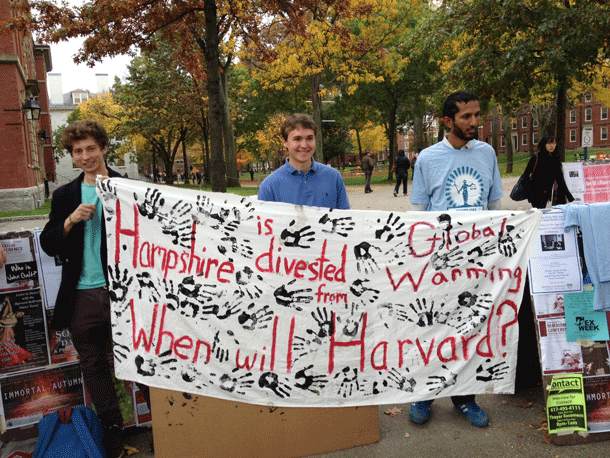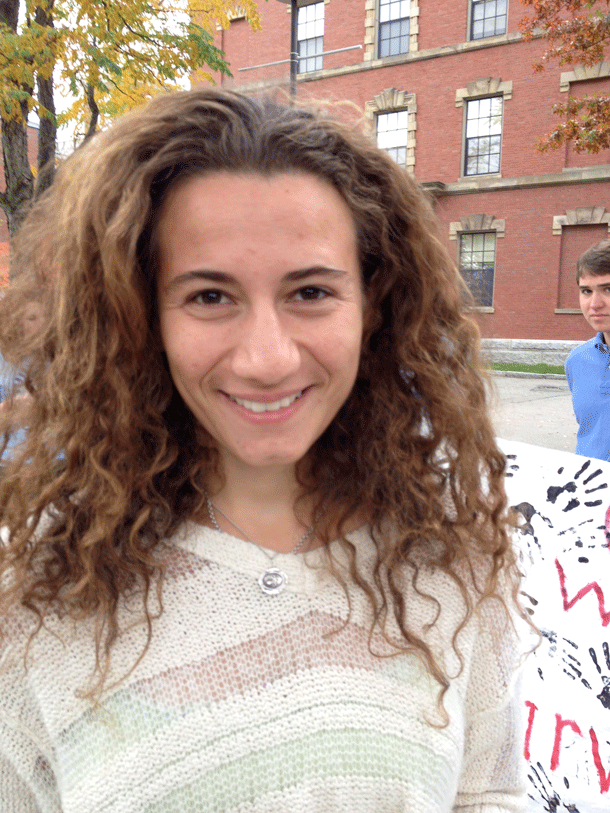Students Demand Fossil Fuel Divestment
Air Date: Week of October 26, 2012

Harvard students hold up a sign encouraging the university to divest from fossil fuels (Photo: Annie Sneed)
Some 25 yrs ago, students demanded their universities pull investments out of South Africa to fight Apartheid. Now, activists want to fight climate change emissions using the same tactic. Host Steve Curwood talks to Harvard students who are asking the college to pull investment from all fossil fuel stocks.
Transcript
CURWOOD: A new battle-line has formed in the wider push to rein in fossil fuel use – on college campuses. Students at some 18 colleges and universities just held a National Day of Action to pressure their administrations to divest their endowment holdings from fossil fuel stocks, a move already taken by Hampshire College in Western Massachusetts.
Among the institutions involved - Cornell, Amherst, Bryn Mawr, Boston University – and the university with the fattest endowment of all – Harvard. Down in Harvard Yard I met one of the organizers of the protest, sophomore Alli Welton.

Harvard student Alli Welton (Photo: Annie Sneed)
WELTON: I think students feel very scared and worried about climate change because this issue will really determine the sort of planet that we live on and the society in which we have our lives. And I think it’s particularly strong to students because we see our entire lives spread out ahead of us.
Also, we’re trying to raise awareness among the members of our administration that the impacts of climate change are already happening right now, and they’re already taking a serious toll – if you look at the drought in the Midwest this summer, the wildfires in Colorado…– we just feel that it’s a really important issue that needs some action right now.
CURWOOD: Harvard has, certainly, the largest endowment of any American university, how much of it is fossil fuel, do you think?
WELTON: So, we can’t give an exact number because not all of Harvard’s endowments or investments are made public. University endowments are generally un-transparent and there have been campaigns for years and years to try to make them transparent. So, the portions of the endowments that we are able to see, it is very clear that Harvard has invested in oil, coal, and natural gas companies, and the Harvard management company confirmed this with us.
CURWOOD: Harvard says it’s in its best interest to have these investments to make money to support the operations - what do you think’s in Harvard’s best interest?
WELTON: I think Harvard’s best interest is maximizing its positive impact on the world, and I think President Faust would make the argument that earning the most money out of our endowment to pay for researchers – the production of knowledge – as she says, is the most important thing.
But if we don’t have a planet that’s stable to live on… I mean, various studies predict that the carrying capacity of the earth will be one billion people by the end of the century… I mean, what kind of Harvard would that be? Climate change is about whether or not Harvard survives as an institution, which is why we feel that it’s so important that we divest from fossil fuels.
CURWOOD: Now, Harvard says, the President of Harvard says it’s her fiduciary responsibility to keep these investments, how do you respond to that?
WELTON: President Faust’s responsibility is to look out for Harvard’s institutional well-being as a whole. And I understand that part of that is earning money off the endowment, so we can have an operational budget and such, but part of that is also that these investments in fossil fuel companies are also threatening Harvard.
Both our students, in terms of our lives, wherever we go in the world after this – climate change could really harm our lives or our chances of getting a job if the economy is strained under increasingly frequent natural disasters, or even Harvard itself… I mean rising sea levels will mean that the Charles River starts to flood.
And if you look at the city of Cambridge’s projections for this, the floodwaters will go right up into where we have our dorms right now – right into the Kennedy School and the Business School. So we think that the President needs to consider that when she thinks about her responsibility for Harvard and how it invests its money.
CURWOOD: Alli Welton helped organize the National Day of Action for Fossil Fuel Divestment. She says they've collected nearly a thousand signatures from students who support them.
OLIVER: My name's Oliver. I’m here today to support the Students for a Just and Sustainable Future in calling for Harvard to divest from fossil fuels, because I think that climate change is a really important issue and one that Harvard should be doing more to tackle through its investments. I mean, Harvard draws a moral line in the sand somewhere – it doesn't invest in tobacco companies on health grounds and if climate change isn't a public health issue then I don't know what is.
MAXMAN: My name is Chloe Maxmin.
CURWOOD: Why are you here today?
MAXMIN: I’m here because I believe that climate change is the defining issue of our generation, and for a long time environmentalists have been trying to fight global warming by promoting individual action and changing light bulbs, and all that’s important and it brings those issues into the psyche, but when you turn on your light bulb, it’s still powered by coal. And so now this divestment movement is fighting the fossil fuel industry directly, which is why I think it’s taken off so quickly, is because people can see that their individual voices are going to have an impact.

Harvard Student Chloe Maxmin (Photo: Annie Sneed)
CURWOOD: And you’ve spoken with the President of Harvard about this? What did she tell you, and what did you tell her?
MAXMIN: We told her that Harvard, as a leading moral institution in our society, has a responsibility to stay true to its values of promoting service and education in America and around the world, and that by investing in fossil fuels, we are potentially going against all of our gains that we have on campus through our green buildings and our sustainability education, and we want her to uphold the values that our institution proposes to promote throughout society.
And she said that Harvard would not be divesting from climate change because our endowment is not something we use to pursue social goals, but we know that that’s not true, because Harvard divested fully from big tobacco, and we also sold 50 million dollars worth of Citibank securities during the South African divestment movement.
CURWOOD: Chloe Maxmin. Harvard provided a statement explaining that they have divested on rare occasions, but quote: “The University maintains a strong presumption against divesting itself of securities for reasons unrelated to investment purposes…."
Links
Living on Earth wants to hear from you!
Living on Earth
62 Calef Highway, Suite 212
Lee, NH 03861
Telephone: 617-287-4121
E-mail: comments@loe.org
Newsletter [Click here]
Donate to Living on Earth!
Living on Earth is an independent media program and relies entirely on contributions from listeners and institutions supporting public service. Please donate now to preserve an independent environmental voice.
NewsletterLiving on Earth offers a weekly delivery of the show's rundown to your mailbox. Sign up for our newsletter today!
 Sailors For The Sea: Be the change you want to sea.
Sailors For The Sea: Be the change you want to sea.
 The Grantham Foundation for the Protection of the Environment: Committed to protecting and improving the health of the global environment.
The Grantham Foundation for the Protection of the Environment: Committed to protecting and improving the health of the global environment.
 Contribute to Living on Earth and receive, as our gift to you, an archival print of one of Mark Seth Lender's extraordinary wildlife photographs. Follow the link to see Mark's current collection of photographs.
Contribute to Living on Earth and receive, as our gift to you, an archival print of one of Mark Seth Lender's extraordinary wildlife photographs. Follow the link to see Mark's current collection of photographs.
 Buy a signed copy of Mark Seth Lender's book Smeagull the Seagull & support Living on Earth
Buy a signed copy of Mark Seth Lender's book Smeagull the Seagull & support Living on Earth

